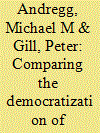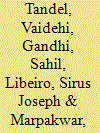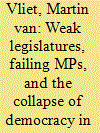| Srl | Item |
| 1 |
ID:
132887


|
|
|
|
|
| Publication |
2014.
|
| Summary/Abstract |
This introductory article discusses some of the main themes that are contained within this collection originally delivered as papers to two conferences. There is brief consideration of some issues of method and major themes relating to the legacy of authoritarian regimes, the process of change and the current state of 'democracy' are identified. Continuing controversies and uncertainties around intelligence have important implications for democratic governance in many countries which must encourage more comparative work in this key area of intelligence studies.
|
|
|
|
|
|
|
|
|
|
|
|
|
|
|
|
| 2 |
ID:
132078


|
|
|
|
|
| Publication |
2014.
|
| Summary/Abstract |
In developing countries, separation of powers coexists with corruption by the ruling elite. This can be attributed to informal institutions, which counter the formal checks and balances. We demonstrate, by studying the Adarsh scam, the vulnerabilities of checks and balances. Fourteen actors belonging to different tiers of the Indian federal setup who could have vetoed the project or certain permissions failed to do so.We find that 54 percent of the checks collapsed because of quid pro quo, 21 percent due to being overridden, 4 percent due to misrepresentation, 7 percent due to absorption, and 14 percent due to omissions in the process.
|
|
|
|
|
|
|
|
|
|
|
|
|
|
|
|
| 3 |
ID:
131811


|
|
|
|
|
| Publication |
2014.
|
| Summary/Abstract |
The sudden collapse of Mali's democracy in 2012 revealed the fragility of the state's legitimacy and authority. This article argues that the decay of democracy was linked to the weakness of the country's legislature. Malian MPs collectively failed to scrutinize an increasingly discredited executive and parliamentarians typically operated in isolation from the vast majority of citizens. As a result, rising levels of popular discontent were rarely channelled into the formal political process, and the interests that did enter the political arena were largely restricted to the personal support networks and electoral constituencies of individual MPs. The prevalence of these particularistic interests undermined collective parliamentary scrutiny of matters of national interest. By demonstrating the link between these failures and the collapse of Mali's democracy, this article contributes to the expanding body of literature examining the limited role of African parliaments in processes of democratic consolidation. In doing so it confirms the challenges that executive dominance poses to democratization, while highlighting the importance of representative legislatures to Africa's democracies.
|
|
|
|
|
|
|
|
|
|
|
|
|
|
|
|